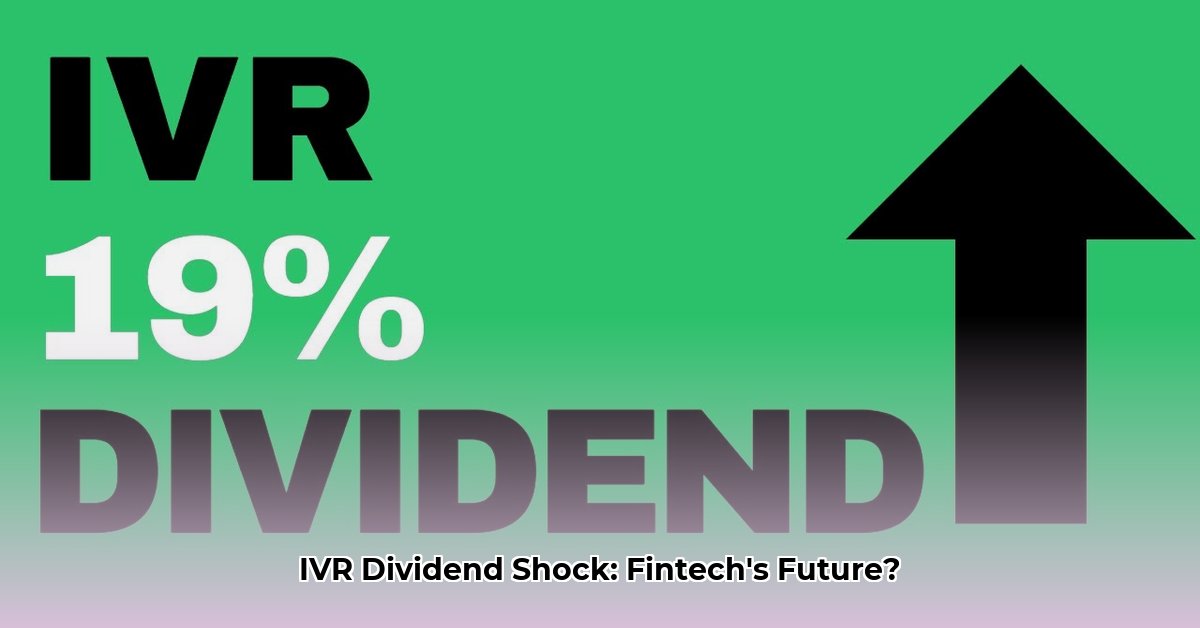
The recent suspension of dividends by Invesco Mortgage Capital (IVR) signals a significant shift within the mortgage finance industry, highlighting the interplay between rising interest rates, intensified Fintech competition, and the need for adaptive risk management strategies. This analysis delves into the causes of the suspension, explores the impact of Fintech disruption, assesses the associated risks, and offers actionable insights for investors, IVR management, and regulators.
Understanding IVR's Dividend Suspension
Invesco Mortgage Capital (IVR) 1, a prominent player in the mortgage-backed securities market, announced the suspension of its dividend payments, sending ripples through investor circles. This action reflects the challenging environment facing mortgage REITs (Real Estate Investment Trusts) due primarily to escalating interest rates. Higher borrowing costs reduce refinancing activity, a crucial revenue stream for IVR, leading to decreased profitability. This situation necessitates a re-evaluation of IVR's financial health and its ability to withstand market volatility. How can investors best understand and react to this shift?
Fintech's Disruptive Force
The rapid ascendancy of Fintech companies is transforming the mortgage industry. These firms offer faster, more cost-effective mortgage solutions, posing a significant competitive challenge to traditional players like IVR. While Fintech presents opportunities for increased efficiency and reduced costs, it also intensifies competition and necessitates innovative strategies for survival. Considering the aggressive adoption of technological advancements like AI-driven valuation models, how is IVR positioned relative to its more agile competitors?
Risk Assessment: Navigating the Uncertainties
The risks facing IVR are multifaceted and interconnected, demanding a comprehensive approach to risk management. The following matrix clarifies the likelihood and severity of key risks:
| Risk Factor | Likelihood of Impact | Severity of Impact | Potential Mitigation Strategies |
|---|---|---|---|
| Soaring Interest Rates | Very High | Very High | Diversify revenue streams; Invest in advanced risk modeling |
| Intense Fintech Competition | Very High | High | Form strategic partnerships; Develop innovative tech solutions |
| Unpredictable Regulatory Changes | High | High | Proactive regulatory compliance; Engage with policymakers |
| Challenges with AI/AVM Implementation | Medium | Medium | Thorough testing; Address potential bias and compliance issues |
This risk assessment highlights the urgent need for proactive measures to mitigate these challenges. The interconnected nature of these risks demands a holistic approach to risk diversification and mitigation.
Actionable Insights: A Path Forward
The current situation demands decisive action from various stakeholders:
For IVR Management: Strategic partnerships with Fintech companies to leverage technological advancements (e.g., AI-powered underwriting, automated valuation models) are essential, alongside diversification of revenue streams and enhancements to risk modeling capabilities. A proactive approach to regulatory compliance and a focus on operational efficiency will be critical.
For Investors: A thorough review of investment strategies is necessary, incorporating a diversified portfolio approach to lessen reliance on mortgage-backed securities. Closely monitoring IVR's adaptation strategies and financial performance is crucial for informed investment decisions.
For Regulators: The rapid technological advancements in the mortgage industry require adaptive regulatory frameworks to ensure transparency and fairness, while adapting to the dynamic use of AI and other emerging technologies in lending. Continuous monitoring of market developments and proactive engagement with industry stakeholders are crucial to safeguarding investor interests.
Conclusion: Adapting to the New Landscape
IVR’s dividend suspension underscores the vulnerability of traditional mortgage finance companies to rising interest rates and Fintech disruption. The path forward hinges upon strategic adaptation, risk management, and collaboration. For IVR, this means embracing technological innovation and diversifying its operations. For investors, it is a call for vigilance and diversification. For regulators, it necessitates proactive oversight and the adoption of flexible regulatory structures. The continued success in this sector requires companies, investors, and regulators to respond to the rapidly evolving technological and economic landscape.
Disclaimer: This analysis is based on publicly available information and is for informational purposes only. It does not constitute financial advice. Investors should conduct thorough due diligence and consult with a financial professional before making any investment decisions.